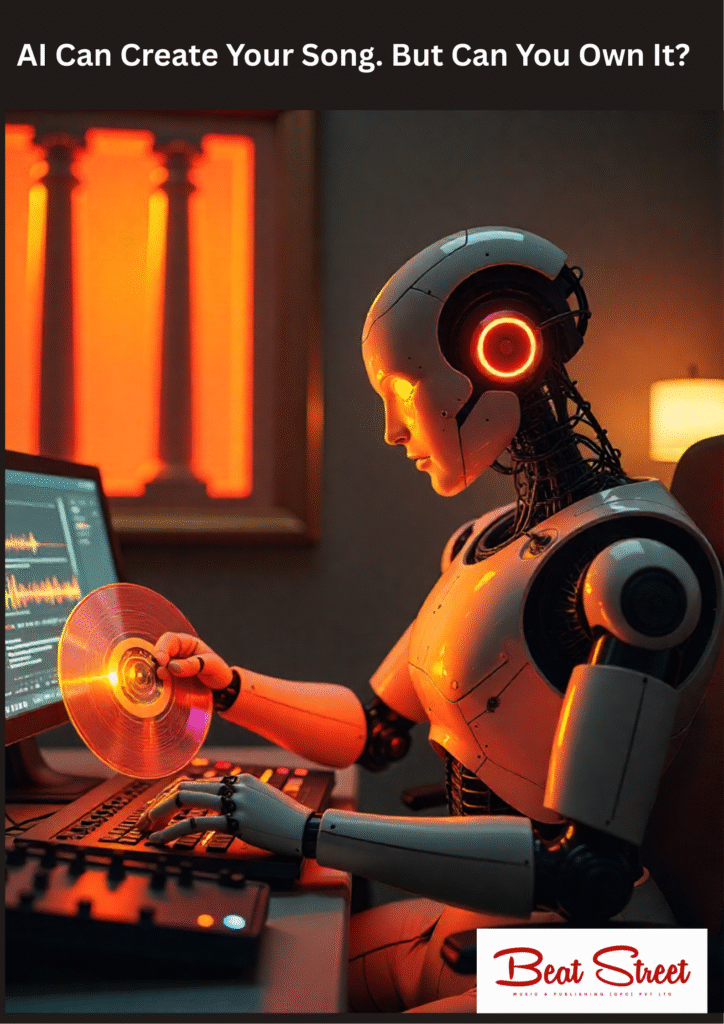What if you could generate a hit song with AI, only to find out you don’t actually own it. It can get worse, you can’t stop someone else from stealing it? That’s the unsettling reality at the heart of a new legal battle between AI music generator Suno and a group of independent artists.
Suno’s core defence is bold: their AI doesn’t “sample” music, it generates entirely new sounds. Therefore, they argue, it can’t infringe copyright. It’s a technicality that could reshape the entire industry.

The Legal Defence: Section 114(b) (U.S.)and “No Sampling”
At the heart of Suno’s case is a specific part of US copyright law that protects the actual sound of a recording. Suno argues that since it doesn’t copy-paste audio snippets (samples), they are following the law. So even if an AI song sounds identical to an existing track, it isn’t a “sample” in the legal sense.
It’s a bold stance. If courts accept it, AI music could be shielded from many infringement claims.
Think of it like this: It’s the difference between someone stealing a master recording from your hard drive (illegal) and a soundalike singer perfectly imitating your voice on a new track (a legal gray area). Suno claims it’s only doing the latter.
The Other Battle: Copyrightability of AI Works
But here’s the twist. While Suno is defending itself in court, its own help pages tell users something important:
- If you’re on the free plan, Suno owns the songs (you can use them only non-commercially).
- If you’re on Pro or Premier, you own the songs and can monetise them.
- But and this is key: 100% AI-generated songs may not qualify for copyright protection in many jurisdictions, including the US, because they aren’t created by a human.
So Suno’s legal defence is about avoiding infringement, but its terms warn users that they might not be able to protect their own songs under copyright law.
Why This Matters for Creators
This creates a bizarre “ownership paradox.” You might have a license to sell the song, but you can’t call the police if someone else takes it. This isn’t an abstract legal debate. It’s about whether a creator using AI can build a sustainable career, or if their work will forever be vulnerable to theft with no recourse.
This dual reality puts creators in a tricky position:
- You may be able to distribute and monetise your Suno tracks.
- But if someone copies or mimics them, you may struggle to claim legal protection — unless you’ve added your own human authorship, like writing lyrics or melodies yourself.
For independent artists, this is the tension. AI tools open new creative doors, but they also raise questions about ownership, protection, and long-term value of IP.
The Bigger Picture
Suno’s motion comes as AI companies face lawsuits worldwide — from US majors like Universal and Warner to Germany’s GEMA. At the same time, federal courts have recently sided with AI platforms in book-related cases, strengthening the “fair use” argument for training AI models.
The outcome of these cases will decide not just whether AI platforms survive, but also how creators and rights-holders get compensated (if at all).
My Take
Suno’s argument is clever: “we don’t sample, so we don’t infringe.” But for artists, the bigger issue is different: even if you create something on Suno, can you truly own it?
Until copyright law catches up, creators using AI music tools should think carefully:
- Add human authorship (lyrics, composition input) wherever possible.
- Check licensing terms before distributing AI music.
- Remember that monetisation ≠ copyright protection.
The AI music revolution isn’t just about technology. It’s about redefining who gets to own, protect, and profit from creativity.
So I want to hear from you: Where should the line be drawn? Does a human just need to type the prompt to claim copyright, or should they have to write melodies and lyrics themselves? Share your take in the comments.
Leave a Reply